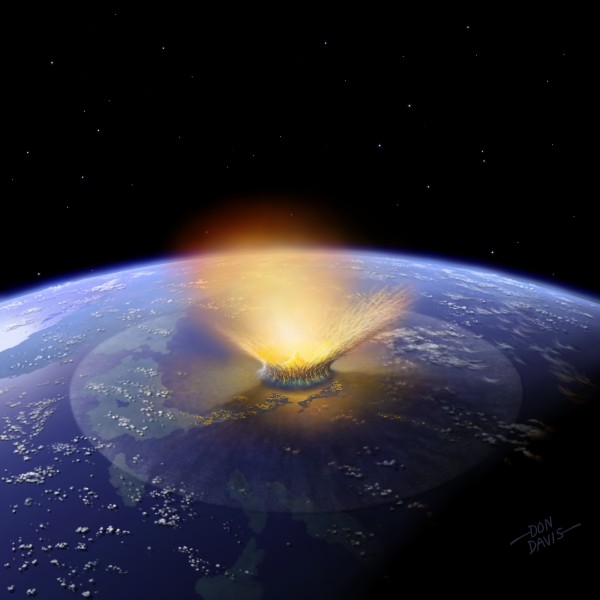“Most estimates of the mortality risk posed by asteroid impacts put it at about the same risk as flying in a commercial airliner. However, you have to remember that this is like the entire human race riding the plane — it is one of the few risks that really could wipe us all out.” -Nathan Myhrvold
Yes, it's easy to say that even though the risks of getting killed by an asteroid strike are low, the consequences of a major asteroid strike are simply too high for us to not address this threat.
But is that really true? This isn't pontificating; this is science! And in the scientific realm, if we have a question like this, we can quantify just what the risks to a human being actually are.
 Image credit: Howard Edin (Oklahoma City Astronomy Club), via http://apod.nasa.gov/apod/ap081011.html.
Image credit: Howard Edin (Oklahoma City Astronomy Club), via http://apod.nasa.gov/apod/ap081011.html.
Come and learn the truth about asteroids, and the threat they pose to us.


In your bullet-pointed list you conclude with:
" That means there will be no asteroids left in the Solar System, because they all will have struck Earth, in another few hundred million years.
Think someone’s overestimated something there? Yeah, me too. "
Here you seem to regard the number of NEA's as finite. In reality, the NEA population is constantly replenished with new objects from the asteroid belt due to perturbations into earth-crossing orbits when they come near resonances.
Also: we DID see one of the 29 coming (asteroid 2008 TC3 impacting over Sudan in 2008).
If I have a one-in-70,000,000 chance of be killed by an asteroid strike in any given year, and there are 7 billion people on the planet, does that mean that hundreds of people should be killed by asteroids every year?
Puzzled here. If: "An asteroid smaller than about 10 meters (33 feet) that hits the atmosphere will not make it down to the Earth’s surface" then what about all the thousands of small objects that people pick up that we are told have come from space? Are these all fakes?
I say this with all respect and I know it is a harsh comment to make, but people need to die. Earth is continually getting overpopulated with us humans resorting to natural habitat destruction and expending of natural resources. Things like tsunamis, earthquakes, cyclones, volcanic eruptions and even the very rare meteor impact are all mother nature's way of regulating.
Humans should stop being so concerned about death and start appreciating the mere beauty of life itself and accept that when its time its time. The millions spent in trying to stop and save people in natural disasters can be of better use in another department.
If I had to die tomorrow in such a way, I'd be content. But that's just my opinion.
The article is quite awakening. I didn't know about the risk of the whole human kind being wiped out completely Its a good thing that we have scientists doing research on these kinds of stuff, but what scares me is the number of asteroids that have hit Earth since 2000 which is approximately 26 and they took us by surprise' I wish there was a way of predicting these events and preventing them, unfortunately I don't think that there could be a way of stopping a giant stone coming from outers pace at an incredibly fast speed.someone please tell me there is a way of preventing this mass extinction
Reading through articles like this one really puts things into perspective sometimes... I find that it highlights the minuscule nature of people to a frightening point. The bare concept that everything that has developed through the years humans have existed on the planet may be wiped out by a single astroid-like object that might be of the seismic proportionality that it, itself may even remain unscathed. I do however feel that for the sake of sanity, anyone with a fundamental or broad knowledge of these matters must remain such that it doesn't boggle ones mind too much. On the transverse side I do feel that we as humans can be accredited with least having an awareness of what is going on around us, even if we have no control over it.
Reading this post has made me realise that asteroids are a threat to earth and we are not aware of it. Should this asteroids hit the earth there is a possibility that we might all get killed by it.
Waterberg,
I think the confusion is that the size of an object as recovered after earth impact is not the same as the original size of the object. A small (<10m) object as recovered on earth undoubtedly was a much larger object before entering the atmosphere. Much of the object is lost during entry.
Thanks so much for sharing your ignorance with us.
You do not know what constitutes the impact hazard. Your impact hazard estimates are off by at least an order of magnitude.
A good place to end your ignorance would be by reading my book "Man and Impact in the Americas", available for free via inter library loan
While I know this is absolutely an anathema to manned Mars flight fantasists, it makes more sense to deal with the impact hazard than to spend billions of dollars on flying a few men to Mars.